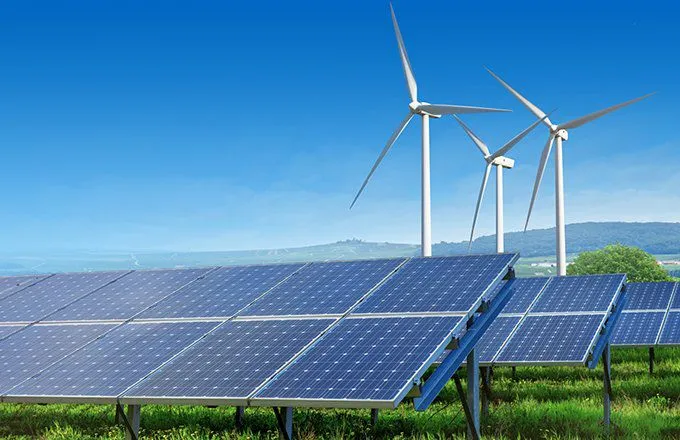
However, the most pressing need for these businesses is the swift completion of policies to implement a direct electricity pricing mechanism. This is seen as a crucial "lifebuoy" for these enterprises at present.
The Government's Determination
On July 9, Deputy Prime Minister Trần Hồng Hà chaired a national meeting, both in-person and online, to supplement and update the implementation plan of the National Electricity Development Plan for 2021 - 2030, with a vision extending to 2050 (Power Plan VIII). A notable aspect of this meeting was Deputy Prime Minister Trần Hồng Hà's request for the Ministry of Industry and Trade to review and update solar and wind power projects, ensuring they align with inspection and audit conclusions from the implementation of Electricity Planning VIII. Nevertheless, he emphasized that these projects must still meet criteria for system safety, transmission technology, and economic efficiency.
In discussing solar power, a representative of the Ministry of Industry and Trade mentioned that the agency has proposed to the Prime Minister to address difficulties for 154 solar power projects that were subject to inspection and investigation. This proposal aims to help localities and investors implement projects in accordance with the power source structure in Power Planning VIII and execute the direct power purchase and sale mechanism (DPPA). This development is viewed as a "glimmer of hope" for resolving the challenges faced by stalled solar power projects due to legal, procedural, and inspection issues.
Why are projects costing thousands of billions of dong being "put on hold"? Under Power Plan VII, there was a plan to install 850 MW of solar power by 2020, increasing to 4,000 MW by 2025. However, solar energy growth has far exceeded planning, reaching over 17 times the approved capacity. According to the Government Inspectorate's conclusion at the end of 2023, the Ministry of Industry and Trade approved the addition of 154 solar power projects to the plan without proper legal basis. Among these, 123 projects have caused significant imbalances in the system and power structure.
The rapid and unplanned growth of solar power has resulted in numerous issues. Many of these projects were initiated without thorough consideration of the existing grid's capacity to handle the influx of renewable energy. This has led to operational challenges and inefficiencies, causing financial strain on both the investors and the national grid. The government's intervention aims to rectify these issues, ensuring that future solar power projects are implemented more systematically and sustainably.
Regarding wind power, the Government has tasked the Ministry of Industry and Trade with enabling localities to review and propose solutions for various wind power projects, aiming to balance the interests of localities, businesses, and investors. Previously, the Ministry had suggested removing some wind power projects from the Power Planning VIII implementation plan due to delays or conflicts with mineral areas. Local leaders explained that many projects were merely behind schedule, without being subject to criminal prosecution or investigation.
Wind power projects have also faced significant hurdles. The complexities of site selection, regulatory approvals, and logistical challenges have delayed many projects. Additionally, some proposed sites overlap with mineral-rich areas, leading to conflicts and further delays. The government's recent directive aims to streamline the approval process, providing clear guidelines to avoid future conflicts and ensuring timely project completion.
On July 10, the Government Office issued a directive for the Ministry of Industry and Trade and other relevant ministries to study mechanisms and policies to encourage self-produced rooftop solar power. The government requires the Ministry of Industry and Trade to pilot projects where unused surplus electricity is sold to the national grid, capped at 10% of total capacity. Both the Ministry of Industry and Trade and the Ministry of Finance are to establish purchasing price regulations that balance benefits and risks. Vietnam Electricity Group (EVN) is responsible for purchasing excess electricity output, ensuring the safe operation of the electricity system, and promoting the development of this mechanism.
This initiative aims to encourage individuals and businesses to invest in rooftop solar panels, reducing their reliance on the national grid and promoting renewable energy generation at a local level. By allowing surplus energy to be sold back to the grid, it provides a financial incentive for households and businesses to adopt solar power, thereby contributing to the national renewable energy targets.
Businesses in Need of a "Lifebuoy"
Experts and representatives of renewable energy enterprises indicate that implementing the current DPPA mechanism remains challenging. Direct power purchase contracts put considerable pressure on the power grid, which must balance the increasing volume of renewable energy. Thus, policies must be in place to manage the grid's load capacity.
The DPPA mechanism allows businesses to enter into direct agreements with renewable energy producers, bypassing traditional utility companies. While this can provide cost savings and enhance energy security for businesses, it also places additional demands on the grid. The government needs to develop policies that ensure the grid can handle these increased loads, preventing potential disruptions and ensuring a stable supply of electricity.
Additionally, the current price of gas and storage is one and a half times higher than EVN's retail electricity price, discouraging investment from businesses other than EVN, despite the ambitions of Power Plan VIII. If EVN invests on its own, it will incur losses, but without electricity and storage, renewable energy expansion cannot proceed as required by businesses seeking the DPPA mechanism.
The high costs of energy storage and gas infrastructure pose significant barriers to the widespread adoption of renewable energy. These costs need to be addressed through subsidies, incentives, or technological advancements to make renewable energy more competitive with traditional energy sources. The government must create an environment that encourages investment in these areas, ensuring the necessary infrastructure is in place to support renewable energy growth.




















